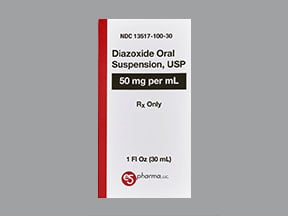
Diazoxide Coupons & Savings Card – Discount Prices from $89.20
Generic for: Proglycem
My prescription
Edit
30ML of 50MG/ML, Diazoxide (1 Bottle)
Select pharmacy

CVS
$143.33
COUPON PRICE
Walgreens
$89.20
COUPON PRICE
Albertsons
$217.18
COUPON PRICE
Walmart
$229.45
COUPON PRICEDiazoxide savings card
Show this card to your pharmacist
Walgreens
$89.20
BIN
ID
PCN
GRP
015995
LHKPU637170
GDC
DR33
Powered by
Related thiazide diuretics prescriptions
More prescriptions for hypoglycemia
Related thiazide diuretics prescriptions
More prescriptions for hypoglycemia
Price history for Proglycem (brand) & Diazoxide (generic)
1 Bottle, 30ML of 50MG/ML
Average retail price for Proglycem
Average retail price for Diazoxide
Average SaveHealth price for Diazoxide
Our price history data is based on aggregated prescription data collected from participating pharmacies in America. Our prescription data updates daily to reflect the latest price changes. If you notice a missing data point, it means there wasn't sufficient data available to generate a monetary value for that date.
We analyzed Diazoxide prices for (30ML of 50MG/ML, 1 Bottle) over the last 12 months. The average retail price was $732.94, while the average price using the SaveHealth discount card was $199.28. That's a savings of approximately 72.81% when using our Diazoxide coupon.
Compared to the generic version, Proglycem had an average price of $573.51 over the same time period. With the SaveHealth savings card, Diazoxide is 65.25% cheaper on average than Proglycem.
*Retail prices are based on pharmacy claims data, and may not be accurate when we don't have enough claims.
Diazoxide dosage forms
Dosage Quantity Price from Per unit 1GM 1 Bottle $344.64 $344.64 1GM 2 Bottles $707.72 $353.86 1GM 3 Bottles $1052.43 $350.81 30ML of 50MG/ML 1 Bottle $143.33 $143.33 30ML of 50MG/ML 2 Bottles $268.36 $134.18 30ML of 50MG/ML 3 Bottles $393.38 $131.13
| Dosage | Quantity | Price from | Per unit |
|---|---|---|---|
| 1GM | 1 Bottle | $344.64 | $344.64 |
| 1GM | 2 Bottles | $707.72 | $353.86 |
| 1GM | 3 Bottles | $1052.43 | $350.81 |
| 30ML of 50MG/ML | 1 Bottle | $143.33 | $143.33 |
| 30ML of 50MG/ML | 2 Bottles | $268.36 | $134.18 |
| 30ML of 50MG/ML | 3 Bottles | $393.38 | $131.13 |
Diazoxide Warnings
Please find below the revised safety and warning information for the medication Diazoxide (Proglycem). It is crucial to review these details and consult with your healthcare provider if you have any questions or concerns.
Fluid Retention: This medication may lead to an accumulation of excess fluid in the body, which can exacerbate heart failure in affected individuals. A diuretic may be prescribed to manage this side effect by promoting increased urination. Discuss any worries or symptoms with your healthcare provider to ensure proper management.
Risk of Ketoacidosis: Diazoxide (Proglycem) has the potential to cause ketoacidosis, characterized by an abnormal acid buildup in the body. This risk is heightened in individuals with pre-existing illnesses. If you experience symptoms such as nausea, vomiting, abdominal pain, fatigue, or difficulty breathing, discontinue use immediately and contact your healthcare provider.
Pulmonary Hypertension in Infants: There have been reports of dangerous lung complications, specifically pulmonary hypertension, occurring in infants and newborns treated with high doses of Diazoxide (Proglycem). These issues typically improve or resolve once the medication is discontinued. If you have any questions or need clarification, consult your healthcare provider.
There are no specific contraindications listed for this medication at this time. Always seek professional medical advice when using this medication, especially if you belong to a sensitive group or have pre-existing health conditions.
Diazoxide Side Effects
Common side effects:
- Sodium and fluid retention
- Swelling
- Extra hair growth on the forehead, back, arms, and legs
- Headaches
- Loss of appetite
Less common but important to monitor:
- Insomnia
- Dizziness
Serious side effects:
- Allergic reaction
Diazoxide Interactions
When taking diazoxide, it's important to be aware of potential interactions with other medications:
Diuretics (Water Pills): Combining diazoxide with diuretics like Hydrochlorothiazide may enhance the risk of elevated blood sugar levels and increased uric acid, potentially leading to gout.
Insulin and Oral Diabetes Medications: Diazoxide can raise blood sugar levels, which may interfere with the effectiveness of insulin or oral diabetes medications.
Blood Pressure Medications: Diazoxide may amplify the effects of antihypertensive drugs, increasing the risk of low blood pressure.
Anticoagulants (Blood Thinners): Diazoxide can displace drugs like Warfarin from protein-binding sites in the blood, potentially enhancing their effects and increasing bleeding risk.
Phenytoin (an Anticonvulsant): Concurrent use with diazoxide may lead to decreased phenytoin levels, possibly resulting in loss of seizure control.
Phenothiazines (a Class of Antipsychotic Medications): These may increase the hyperglycemic effect of diazoxide.
Always inform your healthcare provider about all medications, supplements, and over-the-counter drugs you are taking to ensure safe and effective use of diazoxide.
